La OMC concluye el primer Curso Regional de Política Comercial en línea para la región de Asia y el Pacífico

El 25 de agosto, 24 participantes que representan a 14 Gobiernos completaron el primer Curso Regional de Política Comercial en línea de la OMC para la región de Asia y el Pacífico. El curso, de 14 semanas de duración, abarcó los Acuerdos de la OMC y otros temas relacionados con el comercio, incluidas cuestiones de política comercial regional.
(de momento sólo en inglés)
This was the fifth eRTPC that the WTO has delivered since the COVID-19 pandemic struck in 2020, and the first for the Asia-Pacific region. Participants came from Bangladesh, Bhutan, China, India, Lao People’s Democratic Republic, Malaysia, Maldives, Myanmar, Nepal Pakistan, Philippines, Chinese Taipei, Thailand, and Vietnam.
Organized by the WTO’s Institute for Training and Technical Cooperation (ITTC), in partnership with the Shanghai University of International Business and Economics (SUIBE), the course sought to ensure that trade-related technical assistance continues to be available despite the COVID-19 pandemic.
In her keynote video address delivered at the closing ceremony of the course, the ITTC Director, Bridget Chilala, highlighted that the course took place at a critical moment for global trade, which has been impacted by the COVID‑19 pandemic.
WTO members have been urged by Director-General Ngozi Okonjo-Iweala not to be lulled into complacency following the WTO’s successful 12th Ministerial Conference last June and to start implementing outcomes as soon as possible. Given these circumstances, the course participants had “picked an opportune time to learn more about the WTO and to explore the challenges and opportunities that the multilateral trading system provides,” said Chilala.
Professor Rongming Wang, President of the SUIBE, also addressed the participants at the closing ceremony. Professor Wang congratulated the participants for their successful completion of the course. He expressed SUIBE’s gratitude for the opportunity to participate in preparing and implementing this program and to all the experts from the WTO Secretariat and other international and regional experts for their support and assistance.
The participants expressed appreciation for the eRTPC, noting that this course better equipped them to engage in trade-related discussions and assist their governments in making better informed decisions. They indicated that the eRTPC had broadened and deepened their understanding of the multilateral trading system. The participants also welcomed the opportunity to meet and interact with a wide range of WTO professionals, regional experts, and other Asian government officials, with whom they hope to continue engaging. The participants’ testimonials can be viewed here.
The eRTPC replicated most of the training components offered by face‑to‑face regional trade policy courses, but with adaptations made to accommodate the online environment. The face‑to‑face RTPC usually runs 8 weeks while the duration of the eRTPC was 14 weeks, which allowed participants to continue working while undertaking the course.
The eRTPC included weekly information sessions that showcased the trade-related work being conducted by other multilateral and regional organizations in Asia and the Pacific, such as the International Trade Centre (ITC).
The programme also included a virtual roundtable discussion on Digital Trade and Digital Transformation in Asia. held on Wednesday 24 August 2022. This discussion brought together experts from the Asia-Pacific region to explore the challenges and opportunities of digital transformation, a highly relevant topic to the region.
The virtual roundtable featured guest speakers from the Permanent Mission of Thailand to the WTO and the World Intellectual Property Organization (WIPO), Amazon Web Services, the Alibaba Research Institute and the Economic and Social Commission for Asia and the Pacific (ESCAP).
The event was attended by more than 100 individuals, mostly from Asia, Africa, and Europe, including representatives from governments, the private sector, intergovernmental organizations, and non-governmental organizations. The recording of this virtual roundtable discussion can be viewed here.
















